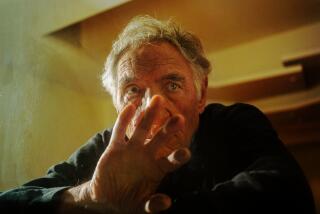Dr. J. I. Kirsch, Psychoanalyst, Author, Dies
- Share via
Dr. James Isaac Kirsch, a psychoanalyst who studied with Carl Jung, founded the C.G. Jung Institute of Los Angeles and authored two books from a Jungian perspective, died Friday in Los Angeles after a long illness. He was 87.
Kirsch was a German Jew who left his homeland with the rise of Adolf Hitler and lived in Palestine and London before settling in Los Angeles. He was an early student of Jung, and maintained a continuous relationship with the pioneering Swiss psychoanalyst from 1929 until Jung’s death in 1961.
Institute in L.A.
In 1947 Kirsch established the C.G. Jung Institute of Los Angeles, now considered a major center of analytical psychology. The institute on Pico Boulevard near Beverly Glen Boulevard trains licensed counselors and offers workshops, lectures, a bookstore and low-fee clinics for the general public.
The Hilda Kirsch Children’s Center located there was named for Kirsch’s wife, who died in 1979. Although her formal education ended with high school, Hilda Kirsch was trained by Jung and worked as a lay analyst.
Kirsch was born in 1901 in Guatemala, where his parents had business interests and lived there until age 7, when the family returned to Berlin. He left Germany in 1933 after Hitler came to power, ultimately coming to Los Angeles in 1940. He traveled frequently between Los Angeles and Zurich to continue his studies with Jung.
Both of his books offered a Jungian analysis of historic figures.
An unusual episode of Jewish history was the topic of Kirsch’s second book. “The Reluctant Prophet,” published in 1973, was a meditation on the the true story of 19th-Century German Rabbi Hile Wechsler, who spoke of dreams that, in retrospect, seemed to anticipate the Holocaust to come. The rabbi succeeded in persuading many Jews to leave Germany for Palestine.
Focus on Shakespeare
His first book had a very different subject matter. In “Shakespeare’s Royal Self,” published in 1966, Kirsch offered a study of the dramatist, particularly through a detailed interpretation of the plays “Hamlet,” “King Lear” and “Macbeth.” In those plays, Kirsch perceived that Shakespeare was undergoing a development that resulted in an extraordinary level of self-understanding--what Jungians call “individuation” and others may term “self-actualization.” Those plays, Kirsch wrote, represented the artist’s command of “his royal self.”
Kirsch is survived by a son, Dr. Thomas Kirsch of Palo Alto, and a daughter, Ruth Kirsch of Lexington, Ky., as well as two stepsons, Gerald Silver and Dr. James Silber, both of Los Angeles. Thomas Kirsch and James Silber are both practicing Jungian psychoanalysts.
More to Read
Sign up for Essential California
The most important California stories and recommendations in your inbox every morning.
You may occasionally receive promotional content from the Los Angeles Times.











